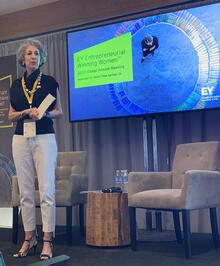
This post was originally published by Lisa Hufford on LinkedIn.
Last week I was privileged to travel to Palm Desert to attend the 2019 Global Annual Meeting of EY Entrepreneurial Winning Women—a program that now includes 500 women entrepreneurs from around the world. To say it was inspiring would be a serious understatement. Lisa Schiffman, pictured below, is our fearless leader and fairy godmother who we are grateful for leading this program since its inception.
I was selected to join the 2014 class of Winning Women and through the years of attending the annual conference, many of the women have become friends. There is nothing more empowering than being in a room of driven women, each making an impact in their own way. This year was no different.

66% of employees are unfulfilled at work
Jeff shared that 66% of employees are unfulfilled at work (source: Imperative's 2015 Workforce Purpose Index). Despite all we hear about employee engagement these days, he believes that what people really want is fulfillment. That resonated with me.
I believe the definition of fulfillment is deeply personal, and different for each person and at different points in their life. As I was reflecting on what fulfillment means to me at this point in my career, I thought about the personal brand workshops I have led over the years. In them, I help people define their unique strengths and passions and articulate what they want in a confident and credible manner. This is the heart of fulfillment: authentically identifying and sharing the thing(s) that motivate you right now in your life. And this is work that each of us must do on our own to determine if our jobs are fulfilling. Sometimes it takes a perspective shift toward our current roles to see that we could be more fulfilled if we could do a little more of what we love every day.
Top job satisfaction driver: business practices in line with my values
For employers like myself, fulfillment is an especially important concern, because 75% of employees are Millennials and Gen Z, and they’re demanding alignment of their personal vision and purpose with that of their employer’s. Aerotek recently conducted a survey of more than 1,200 workers across industries and skill sets and found that the top satisfaction driver was business practices in line with my values. It’s clear that the companies who want to attract the best talent are those who are focused on helping employees achieve fulfillment at work above all else.
What are you doing to find fulfillment at work? And leaders, how are you actively fostering your people’s fulfillment?